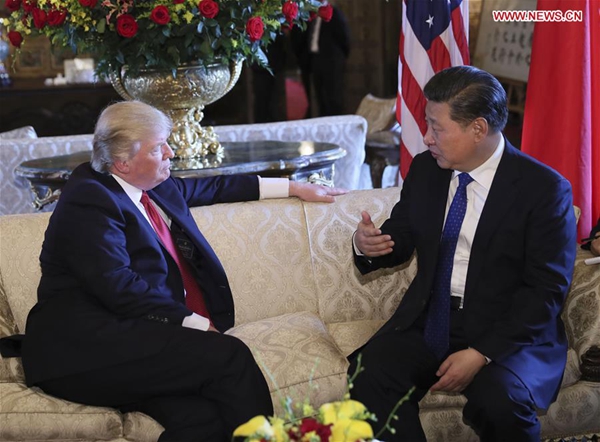Sino-American relations after Xi's Florida visit
- By George N. Tzogopoulos
 0 Comment(s)
0 Comment(s) Print
Print E-mail China.org.cn, April 11, 2017
E-mail China.org.cn, April 11, 2017
|
|
|
Chinese President Xi Jinping (R) meets with his U.S. counterpart Donald Trump in the latter's Florida resort of Mar-a-Lago in the United States, April 6, 2017. [Xinhua/Lan Hongguang] |
A few hours after Chinese President Xi Jinping left Florida, the U.S. Carl Vinson Strike Group departed from Singapore and sailed northward into the Western Pacific Ocean near the Korean Peninsula.
This outlines President Donald Trump's decision to employ a muscular foreign policy approach. The deployment followed his order for airstrikes against a military base in Syria in response to a deadly chemical bombing raid in that country which the Americans blamed on the Syrian government.
It seems that isolationism is no longer Trump's ambition. The president had publicly rejected his characterization as "isolationist" during his recent press conference with German Chancellor Angela Merkel. And, it now becomes evident that he is ready for an expanded U.S. international presence.
He values the importance of security instead of Washington's frequently required mission to change the world, however, limits between the two objectives are not necessarily clear, because their motivations are often interwoven. So, it will not be surprising if it's almost "business as normal" for the U.S. in the coming months.
Xi, meeting Trump for the first time, had several opportunities over a 48-hour period to get familiar with the approach of his newly-elected American counterpart.
Trump had shown himself unpredictable in his first eleven weeks in office, which can be a clever diplomatic tactic. Nevertheless, as time passes, he is gradually losing this advantage.
Perhaps the most important lesson for China is that the country knows now the general principles of American foreign policy under Trump. It maintains continuity with previous presidents rather than discontinuity indefining American calculations.
Attention turned first towards North Korea. Before his meeting with Xi, Trump had attempted to set the tone with a harsh rhetoric against the Chinese administration. "If China is not going to solve North Korea, we will," he said. Several American think tanks have already started to elaborate on the need of American action against North Korea, examining several options after the so-called "strategic patience" expired.
As China and the U.S. disagree on how to proceed with the Pyongyang imbroglio, American unilateral action would be highly risky. China's Foreign Minister Wang Yi confirmed the mutual will for collaboration in the Korean Peninsula, saying the two leaders "agreed to expand cooperation on multiple levels to make contributions to world peace, stability and prosperity."
Of course, the future evolution of Sino-American relations goes well beyond the Korea Peninsula. The agreement between Xi and Trump to make good use of the joint staff dialogue mechanism to boost military communications and deepen cooperation in cybersecurity are positive signs for the future.
However, China prefers a wait-and-see stance on how any balance in the new multilateral world will emerge under Trump. The relationship between the U.S. and Russia is not as harmonious as numerous analysts had predicted after last November's election.
The new Syrian crisis is being closely monitored by Chinese policymakers with regard not only to the human dimension and repercussions for regional security, but also to its impact on the hypothetical rapprochement between Moscow and Washington.
Xi also returned from Florida with two additional conclusions. The first is that Trump is no longer threatening China with a trade war. Some Western media argue his milder rhetoric now is explained on the basis of "concessions" made by Beijing.
The Financial Times, for example, suggested China will offer the Americans better market access for financial sector investments and beef exports to help avert a trade war. Nonetheless, that kind of policy should not be regarded as a desperate Chinese diplomatic move, for it goes hand-in-hand with China's will to promote openness and better opportunities for foreign companies as both Xi and Premier Li Keqiang have said in their recent speeches.
Also, Trump might have already realized the risks from a trade war.
And the second interesting point is that Trump made no reference to human rights in China. In contrast to Barack Obama, the new president has different priorities. This possibly connotes his understanding for China's "core interests."
Trump did not repeat the terminology used by his Secretary of State Rex Tillerson during his recent trip to Beijing in describing the bilateral relationship as "non-conflict" and "non-confrontational," and seems prepared to respect China in his public statements.
All in all, the Xi-Trump Summit in Florida marks a good start for bilateral relations in the new era. More conversations and meetings between the two leaders are expected in the short and medium term. In spite of their existing difference the need of bilateral cooperation between China and the U.S. is currently more urgent than ever.
George N. Tzogopoulos is a columnist with China.org.cn. For more information please visit:
http://www.china.org.cn/opinion/GeorgeNTzogopoulos.htm
Opinion articles reflect the views of their authors, not necessarily those of China.org.cn.







Go to Forum >>0 Comment(s)